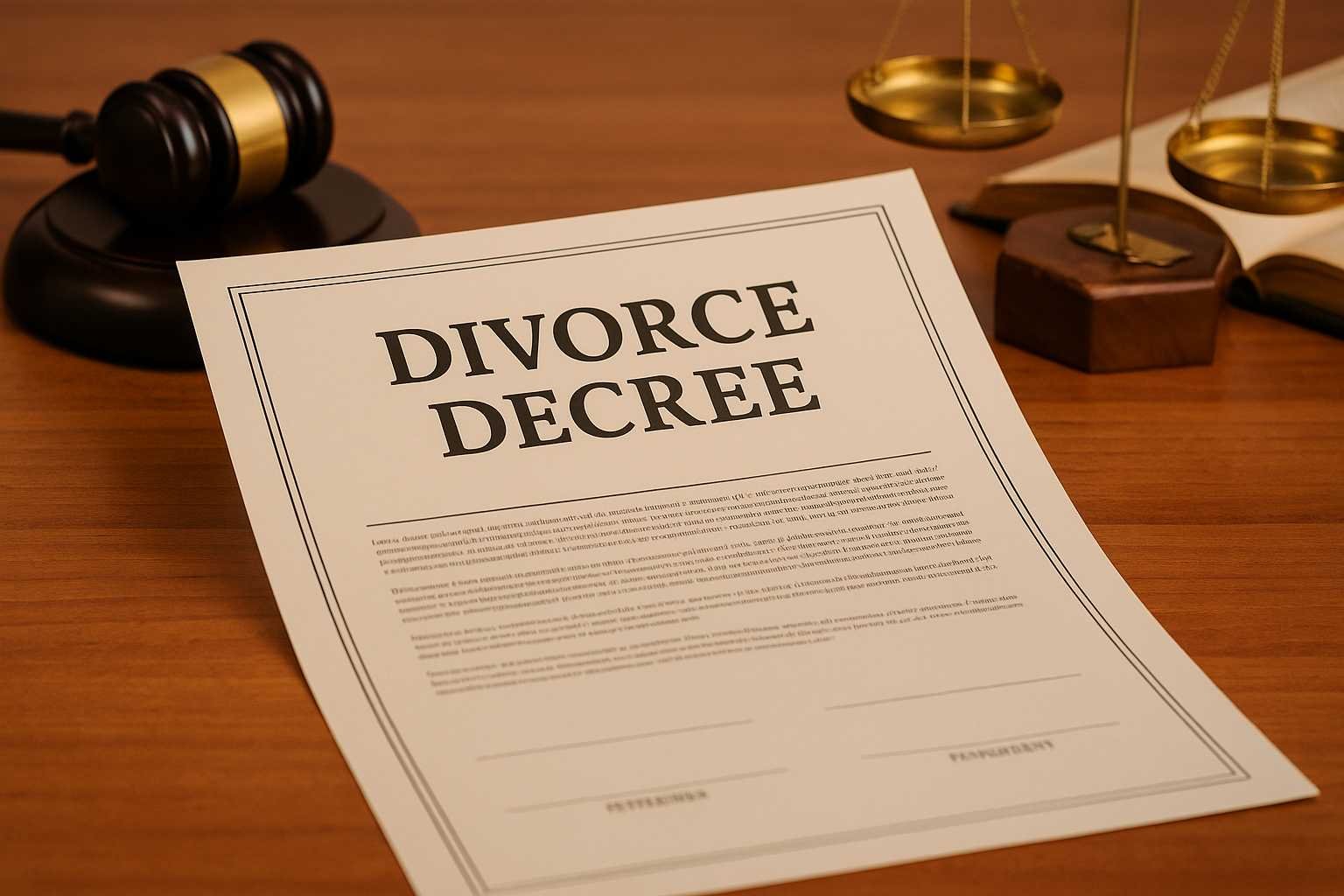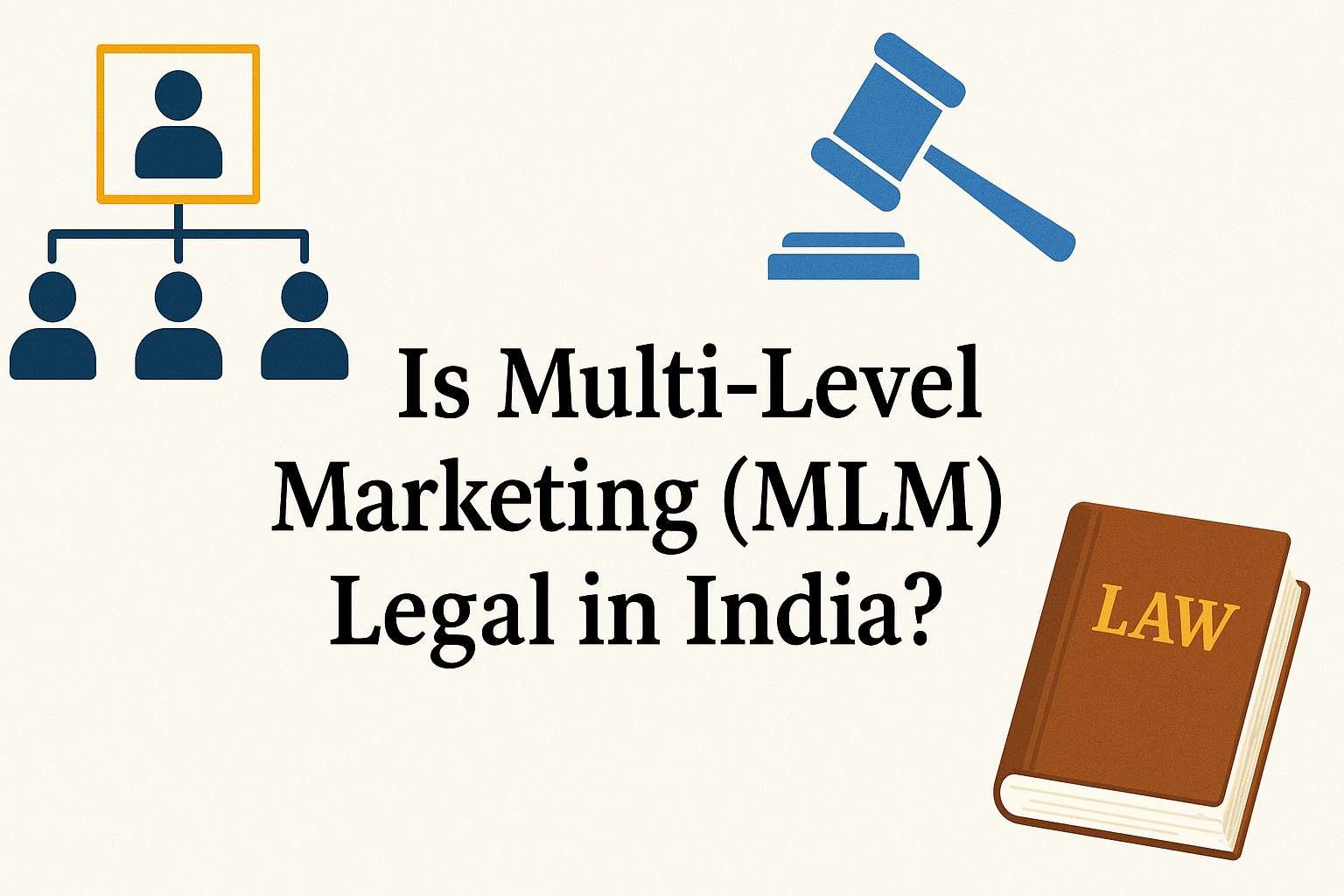On this page you will read detailed information about Divorce Decree
Divorce is a life-changing legal process that officially ends a marriage. But many people don’t realize that the process isn’t over until the divorce decree is issued. This document is the final order of the court that legally dissolves a marriage and records the terms on which the separation has been granted.
Understanding what a divorce decree is, what it contains, and how it affects both parties is essential for anyone going through or finalizing a divorce. Let’s explore its meaning, purpose, contents, and legal implications under Indian family law.
1. What Is a Divorce Decree?
A divorce decree (also called a decree of divorce or decree nisi in some jurisdictions) is the final judgment issued by a competent family court after all divorce proceedings are complete.
It is the official legal document that:
- Confirms the dissolution of the marriage, and
- Records all decisions of the court related to alimony, maintenance, child custody, property division, and other rights and obligations.
In India, a divorce decree can be issued under the following major laws, depending on the religion of the parties:
- Hindu Marriage Act, 1955
- Special Marriage Act, 1954 (for interfaith or civil marriages)
- Indian Divorce Act, 1869 (for Christians)
- Parsi Marriage and Divorce Act, 1936
- Muslim Personal Law (Shariat) Application Act, 1937 combined with Dissolution of Muslim Marriages Act, 1939 (for Muslims).
Once this decree is passed, the marriage is legally terminated, and both individuals regain the right to remarry (after the appeal period expires).
2. Divorce Decree vs. Divorce Certificate
A common source of confusion is the difference between a divorce decree and a divorce certificate.
| Aspect | Divorce Decree | Divorce Certificate |
|---|---|---|
| Issued By | Family Court | Local Registrar / Court (on request) |
| Nature | Judicial order ending the marriage | Official proof that marriage has been dissolved |
| Contents | Includes court’s detailed judgment—alimony, custody, property division | States that a decree of divorce has been granted |
| Purpose | To define rights, obligations, and settlement terms | To serve as legal proof of divorce for documentation purposes (passport, PAN, remarriage, etc.) |
Essentially, the divorce decree is the decision, while the divorce certificate is the record of that decision used for official purposes.
3. When and How Is a Divorce Decree Issued?
A divorce decree is issued only after the court completes all hearings and is satisfied that the marriage has irretrievably broken down, or that grounds for divorce have been proven (such as cruelty, desertion, adultery, or mutual consent).
(a) In Mutual Consent Divorce
Under Section 13B of the Hindu Marriage Act, 1955, both spouses jointly file a petition and appear before the court twice:
- First Motion: The court records their consent and grants six months (cooling-off period).
- Second Motion: After 6 months (which can be waived by the court in some cases), both parties reaffirm their consent.
If the court is satisfied that the marriage cannot be reconciled, it issues a divorce decree finalizing the separation.
(b) In Contested Divorce
When one spouse files against the other, the court examines evidence, witnesses, and legal arguments.
Once the court determines that sufficient grounds exist (e.g., cruelty, adultery, desertion, mental disorder, etc.), it grants the decree—usually after several hearings.
4. Contents of a Divorce Decree
A divorce decree is not a generic certificate—it is a comprehensive court judgment outlining all decisions made during the case. It typically includes:
- Court details – Name of the family court, case number, and judge’s name.
- Names and details of the parties – Husband and wife’s full names, addresses, and marriage details.
- Grounds for divorce – The reason(s) accepted by the court (e.g., cruelty, adultery, mutual consent).
- Date of dissolution – The date from which the marriage is considered legally dissolved.
- Maintenance/Alimony – The amount, frequency, and mode of payment for spousal maintenance.
- Child custody and visitation – Who gets custody, visitation rights, and responsibility for education and healthcare.
- Division of assets and property – Court-ordered division of jointly owned property, jewelry, and financial assets.
- Any restraining or injunction orders – e.g., no-contact clauses or restrictions on asset transfer.
- Right to appeal – A statement mentioning that the decree can be appealed within the stipulated time.
- Signatures and court seal – Authentication of the document by the presiding judge.
This decree serves as a legally binding order—both parties must comply with it fully.
5. Legal Effect of a Divorce Decree
Once the divorce decree is passed:
- The marriage is officially dissolved.
- Both parties become legally single.
- They can remarry after the appeal period (usually 90 days) has expired.
- Obligations regarding maintenance, custody, and property become enforceable.
Non-compliance (for example, failure to pay maintenance or denying custody rights) can result in legal enforcement proceedings or even contempt of court.
Important Note:
The decree comes into effect immediately unless stayed or appealed. If one party appeals in the High Court within the prescribed limitation period, the decree remains subject to the outcome of the appeal.
In the previous post, we had shared information about Can There Be a Middle Ground Between ‘Stay Together’ and ‘Break Up’?, so read that post also.
6. How to Obtain a Copy of a Divorce Decree
If you have been granted a divorce but need a certified copy of the decree for documentation, you can obtain it through the following process:
- Apply to the Court Clerk / Family Court Registry where the case was decided.
- Submit an application form along with:
- Case number
- Parties’ names
- Date of judgment
- Pay the nominal court fee (usually between ₹10–₹50).
- Collect the certified copy after verification or request it online (some states like Delhi, Maharashtra, Tamil Nadu, and Karnataka now offer e-court portals).
Having a certified copy is essential for:
- Updating marital status in government records,
- Changing name or address on IDs,
- Property transfer, and
- Remarriage registration.
7. Common Issues Related to Divorce Decrees
(a) Delay in Issuance
After the final hearing, it can take a few days to several weeks for the decree to be drafted, signed, and sealed. Following up with the court registry or lawyer helps expedite this.
(b) Violation of Decree Orders
If either spouse violates any condition of the decree (e.g., not paying alimony, denying visitation), the aggrieved party can file an execution petition under Order XXI of the Code of Civil Procedure, 1908.
(c) Modification or Clarification
If circumstances change (e.g., child custody, income, or residence), a party may approach the same court to modify parts of the decree—especially maintenance or custody terms.
(d) Appealing a Decree
Under Section 28 of the Hindu Marriage Act, 1955, either party may appeal to the High Court within 90 days from the date of decree. The appellate court can affirm, modify, or overturn the family court’s decision.
8. Digital Access and E-Decree System (2023–2025 Update)
With the digitization of India’s judicial system, divorce decrees are now easier to access:
- eCourts Portal (https://ecourts.gov.in): Provides case status and judgment downloads for most family courts.
- State Judiciary Portals: Many states (Delhi, Maharashtra, Kerala, Karnataka, Gujarat) allow direct online access to decree copies.
- Virtual Hearings: Post-pandemic reforms under the eCourts Mission Mode Project 2.0 (2023–2025) have made divorce proceedings faster and hybrid (online + physical).
- Digital Signatures: Many courts now issue decrees with QR codes or digital seals for authenticity.
These reforms ensure transparency, quicker resolution, and easier record-keeping for divorced individuals.
9. Importance of the Divorce Decree
The divorce decree is not just a piece of paper—it is the legal foundation for a person’s post-marital life. It:
- Confirms that the marriage has ended legally.
- Defines financial, parental, and property rights clearly.
- Prevents future legal disputes or false claims of marriage continuation.
- Serves as proof in official documentation like passport renewals, PAN updates, and remarriage registration.
Without this decree, a divorce is incomplete even if both parties have stopped living together.
Conclusion
A divorce decree is the final, legally binding document that marks the end of a marriage and sets forth the court’s decisions regarding financial, parental, and personal matters. It provides legal closure, defines rights and obligations, and enables both parties to move forward independently.
Understanding its contents, implications, and procedures helps individuals navigate the post-divorce phase with clarity and legal security. With India’s courts increasingly embracing digital access and faster procedures, obtaining and managing a divorce decree is now more efficient than ever.
Disclaimer
The information and services on this website are not intended to and shall not be used as legal advice. You should consult a Legal Professional for any legal or solicited advice. While we have good faith and our own independent research to every information listed on the website and do our best to ensure that the data provided is accurate. However, we do not guarantee the information provided is accurate and make no representation or warranty of any kind, express or implied, regarding the accuracy, adequacy, validity, reliability, availability, or completeness of any information on the Site. UNDER NO CIRCUMSTANCES SHALL WE HAVE ANY LIABILITY TO YOU FOR ANY LOSS OR DAMAGE OF ANY KIND INCURRED AS A RESULT OR RELIANCE ON ANY INFORMATION PROVIDED ON THE SITE. YOUR USE OF THE SITE AND YOUR RELIANCE ON ANY INFORMATION ON THE SITE IS SOLELY AT YOUR OWN RISK. Comments on this website are the sole responsibility of their writers so the accuracy, completeness, veracity, honesty, factuality and politeness of comments are not guaranteed.
So friends, today we talked about Divorce Decree, hope you liked our post.
If you liked the information about Divorce Decree, then definitely share this article with your friends.









